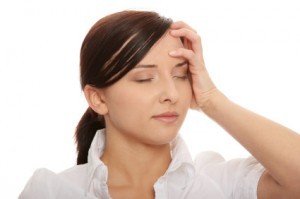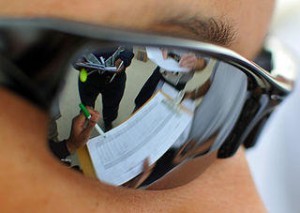Simple Ways To Relieve Dizziness (Lightheaded Feeling)
Dizziness is a feeling that you are unstable and about to fall. We all feel dizzy sometimes, be it after a gravity-defying carnival ride, running around on a very hot day, after a very strenuous workout or if we have not eaten in quite a while. Most of us pass off mild dizziness as being nothing serious and continue with whatever activity we are embroiled in. But when dizziness strikes, you should stop whatever you are doing and wait for it to subside. It is even more worrying when dizziness starts for no apparent reason. Dizziness due to unknown causes may be the first sign of something much more serious that could strike with fatal consequences.
Why does dizziness occur?
There are three major reasons why you may be feeling dizzy, especially when it occurs suddenly:
- A change in your blood pressure or blood oxygen levels meaning that you brain is getting less oxygen.
- A change in your blood glucose levels meaning that your brain tissue is receiving less nutrition.
- A disturbance with your inner ear structures, particularly the semicircular canals, that are responsible for balance.
Other disturbances like a hormonal fluctuation can also lead to dizziness but in most cases it is the above three reasons why dizziness may start suddenly.. Dizziness can also be accompanied by blurred vision, nausea or headaches among other symptoms depending on the cause. It is important to understand that dizziness is a symptom and not a disease.
Here are some of the causes of dizziness with other symptoms:
Without identifying and treating the underlying cause, any attempt to relieve dizziness will be short lived or possibly ineffective. Ignoring repeated episodes of dizziness can be dangerous. It could very well be one of the warning signs of an impending stroke, heart attack, diabetic complications or even an intracranial tumor.
However, the odd episode of dizziness that quickly passes and does not lead to fainting is usually not due to any serious cause. Nevertheless it is worth having it medically assessed. The following tips to relieve dizziness does not mean that you should avoid professional medical attention if the dizziness subsides. It is simply a guide to prevent worsening of the dizziness or possibly even blackouts until you can get to a doctor
Stop What You Are Doing And Sit Down
The first step in trying to relieve dizziness is to stop whatever you are doing and sit down. If you are operating heavy machinery or driving then you need to stop your work or pull up on the side of the road where it is safe. By delaying in doing so when you are on the job or driving you could be risking your life and that of others. Dizziness can strike even when you are sitting so where possible you should try to lie flat. If that is not possible then sit down on a comfortable chair where you can recline to some degree and elevate your legs even if just slightly. Sitting or lying down reduces the workload on the heart, reduces the risk of a fall and allows your body to recover.
Sip A Sugary Drink And Plenty Of Water
A sugary drink can help if your blood sugar levels have dipped low and are the cause of the dizziness. Most of us find sugary drinks comforting so it is advisable even if low blood glucose levels (hypoglycemia) is not the cause of your dizziness. Diabetics need to be cautious though as their body is unable to limit the rise in blood sugar levels. Rather take a few sips of a sugary drink, wait and then take a few more sips if the dizziness does not seem to be tapering down. Do not forget to drink sufficient water on its own. Dehydration is sometimes the cause of your dizziness even if you do not have obvious signs. The sugar is good but you only need a little. Get back to water after a few sips of your sugary beverage.
Close Your Eyes Or Use Sunglasses
Blocking off the visual stimuli around you can help with dizziness, particularly when you are suffering with eyestrain, sensitivity to light and headaches. Closing your eyes is the simplest way to cut out the light. Draw the curtains or turn down the lights where possible because the strong light can still be irritating through the eyelids. Make sure that you are sitting down in a safe place and then close your eyes shut. If closing your eyes on the job or slipping away into a dark room is not possible, then try to put on dark glasses on for a little while. It will reduce the brightness and glare but still allow you to keep your eyes open.
Lie Flat In The Dark
If your doctor has given you the all clear and the other measures are not relieving the dizziness, then it is time to get some rest. The bedroom may be the best place to do so. Lie flat even if you are not feeling sleepy. By lying flat you decrease the workload on the heart, allow blood to flow easily from head to toe and reduce the oxygen and glucose demand by the body. It is better to lie in a dark and quiet room so that the lack of visual and auditory stimuli can assist you in falling asleep. Sometime a good night’s sleep can do the trick provided that your doctor cannot find a serious underlying disease that may be the root cause of your dizziness.
Cool Down When Hot
A hot day can wreak havoc on your blood pressure, especially if you are older, have known heart problems or you are suffering with dehydration. The heat can have a more pronounced effect when you are outdoors in the sun. Dizziness is one symptom of the circulatory changes from a hot environment and of dehydration. Sit down in a cool room. Air conditioning is the preferred option. However, sometimes the fresh air can also do you some good in terms of relieving the dizziness. Stay away from the sun, use light clothes or shed some of the clothing if you are in private and do not undertake excessive physical activity. Your dizziness should gradually subside as you body cools down and you rehydrate with sufficient fluids.
Elevate Your Legs
Elevating your legs, whether it just putting it up on a foot stool or propping it on few pillows when you lie flat, can help for many reasons. Gravity helps to send blood that may have pooled in the legs back to the torso. The returning blood can then be re-oxygenated at the lungs and there is sufficient blood volume being pushed out of the heart to supply the brain with oxygen. Elevating the legs can suddenly increase the workload on the heart which may not be a good idea if the heart is already weak. However, it is difficult for the average person to discern when such a problem exists. Rather elevate your legs just slightly. One or two flat pillows under the feet when lying down is unlikely to be too much of a danger if your have a pre-existing heart problem.









